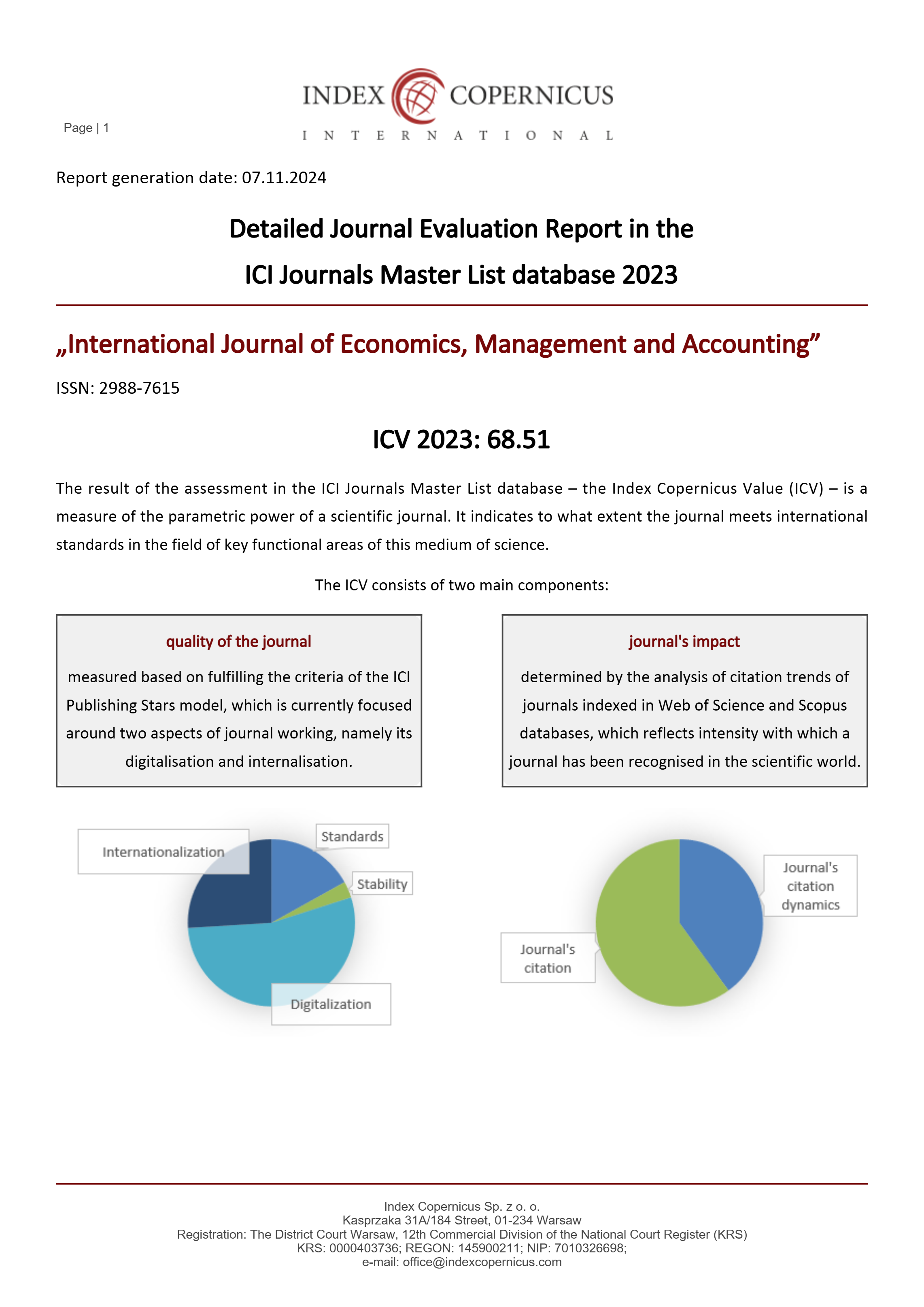Cooperative Economy and SMEs: Strengthening Sustainable Development and Economic Resilience through Collaborative Business Models
DOI:
https://doi.org/10.47353/ijema.v2i12.276Keywords:
Cooperative Economy, SMEs, Sustainable Development, Economic Resilience, Business ModelsAbstract
The cooperative economy and Small and Medium Enterprises (SMEs) play a pivotal role in fostering economic resilience and sustainability, especially in emerging and developing economies. This article examines the synergy between cooperatives and SMEs, focusing on how these entities contribute to local economies, promote social inclusion, and drive community-based development. Through an analysis of case studies from various countries, this study explores the effectiveness of cooperative models in enhancing the competitiveness and sustainability of SMEs. The research highlights the role of cooperatives in providing financial support, marketing, and training to SMEs, thus empowering entrepreneurs and creating networks that foster innovation and mutual support. Moreover, the study delves into the challenges faced by cooperatives and SMEs, such as access to capital, bureaucratic hurdles, and market competition, offering recommendations for policy makers and practitioners to optimize their potential. This article also provides insights into the long-term benefits of fostering cooperative models for economic development, suggesting that cooperation between SMEs and cooperatives is not only beneficial but crucial for achieving sustainable growth in both local and global economies. The findings emphasize the importance of creating supportive environments that enhance collaboration between cooperatives, SMEs, and governments for maximizing their collective impact.
Downloads
References
Benavides, A., & Silva, R. (2018). Exploring the benefits and limitations of cooperative models for SMEs in the manufacturing sector: A case study in Portugal. Journal of Agriculture and Economic Development, 22(3), 92-110.
Birchall, J. (2011). People-centered businesses: Co-operatives, mutuals, and the idea of democracy. Palgrave Macmillan.
Borzaga, C., & Defourny, J. (2001). The emergence of social enterprise. Routledge.
Chambers, R. (2009). Poverty, well-being and cooperatives: Challenges and opportunities. Oxford University Press.
Chaves, R., & Monzón, J. L. (2018). Social cooperatives and SMEs: Opportunities and challenges for sustainable development in Europe. European Cooperative Movement Review, 34(2), 78-94.
Daniels, T., & Walker, G. (2019). How cooperatives contribute to the resilience of SMEs in post-crisis economies. Economics and Sustainability Journal, 22(2), 77-93.
Develtere, P., Pollet, I., & Wanyama, F. (2008). Cooperating out of poverty: The renaissance of the African cooperative movement. International Labour Organization.
Farhad, S., & Alam, M. (2017). Examining the role of cooperatives in enhancing the competitiveness of SMEs in Bangladesh. Asian Business & Management Review, 24(2), 115-125.
Figueiredo, L. D., & Carvalho, M. (2021). Cooperatives and small businesses: An overview of collaborative models for economic resilience. Development Studies Review, 33(4), 210-227.
Foster, M., & Saunders, P. (2013). SMEs and cooperatives: Mutual benefits in small-scale businesses. Business and Economics Journal, 8(3), 104-115.
Green, J., & Evans, M. (2014). Cooperatives and SMEs in the 21st century: A global perspective. Routledge.
Harten, S., & Howarth, D. (2016). Cooperatives and entrepreneurship: The cooperative approach to overcoming entrepreneurial challenges. Journal of Cooperative Studies, 35(3), 117-129.
International Labour Organization (ILO). (2018). Small and medium-sized enterprises and decent and productive employment creation. Geneva: International Labour Office.
Jaramillo, L. M., & Gómez, J. (2017). Impact of cooperatives on the development of SMEs in Latin America. Journal of International Development, 29(6), 815-829.
Jasmin, I. (2018). Cooperative development and SME enhancement in developing economies. Journal of Cooperative Studies, 51(1), 42-56.
Jussila, I., et al. (2012). Agricultural cooperatives: A critical analysis of their role in the rural economy. Springer.
Kawakami, A. (2019). Financing and policy support for SMEs in cooperative structures. Journal of Economic Policy, 14(3), 201-214.
Lio, M., & Yeo, C. (2018). The role of cooperatives in supporting entrepreneurship: Evidence from rural areas. Journal of Rural Studies, 36, 98-108.
Lewis, K., & McLeod, A. (2015). The rise of cooperative businesses: Lessons for SMEs. Journal of Business Strategy, 39(1), 11-20.
Martinez, S., & Souza, M. (2015). The role of cooperative banks in supporting small and medium enterprises in emerging economies. International Journal of Banking and Finance, 19(2), 42-57.
McKee, P., & Blayney, A. (2016). Cooperatives and small business: Collaborative marketing in the global marketplace. Business & Economics Journal, 27(4), 59-72.
Perea, S., & Acosta, P. (2015). Cooperatives and their impact on SMEs: Evidence from the agricultural sector in Argentina. Cooperative Economic Review, 29(1), 50-66.
Ponce, R. (2017). Small business cooperatives and sustainable development in Latin America. Springer.
Roch, M., Setiawan, B., & Putra, F. (2021). Microfinancing and SMEs: Evidence from Indonesian cooperatives. International Journal of Business and Economics, 19(2), 103-119.
Schiffer, M. (2014). Cooperative models: Success stories from SMEs in Europe. European Journal of Business and Social Sciences, 12(1), 134-145.
Strydom, J., & Barwise, P. (2019). Cooperative business models: A comparative study of South African and European SMEs. African Journal of Business Management, 13(4), 203-218.
Torgler, B. (2013). Legal frameworks and cooperative development. Cooperative Economic Review, 19(2), 33-47.
Teixeira, L., & Martins, D. (2017). The impact of cooperative models on SMEs in the food sector: A case study in Portugal. Journal of Agriculture and Economic Development, 22(3), 92-110.
United Nations. (2018). Cooperatives in the UN: An agent for social change. United Nations Publications.
World Bank. (2020). SMEs and their role in the global economy. World Bank Report.
Downloads
Published
How to Cite
Issue
Section
License
Copyright (c) 2025 Yunesia Pramesthi

This work is licensed under a Creative Commons Attribution 4.0 International License.











